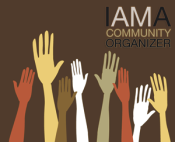Even after afrosphere blogger Francis L. Holland, Esq. refused to publicize the Political Justice Degrees website in exchange for their linking to this blog, they have nonetheless selected this Police Brutality (and Atrocity) Blog as number eight among 100 "Police and Detective Blogs". This is particularly significant in light of the their criteria for selecting blogs for this list.
The Criminal Justice Degrees Guide says:
Criminal justice is perhaps one of the the most broad reaching fields of study in education today. It incorporates not only the topics that immediately come to mind such as law enforcement, corrections and the courts, but also political history, social issues, psychology and civil liberties among many others. This diversity of issues makes criminal justice dynamic but it also makes it dizzyingly complex for someone trying to educate themselves in justice issues. Consequently, we have compiled this list to help anyone involved in the criminal justice field — including academics, practitioners and students — find information and resources about their niche, as well as any other aspect of criminal justice.
Our Police Brutality (and Atrocity Blog) is number eight among the list of 100 blogs.Police and Detective Blogs
Get a feel for what it’s like to police the streets in some of the world’s toughest cities by checking out this list.
I say 'our blog' because this blog is a compendium of cases, incidents and atrocities supplied by dozens of primarily but not solely AfroSpear and afrosphere blogs from across the country and overseas. The blogs include African American Pundit; the Tasered While Black blog; the Field Negro blog; Electronic Village; Eddie G. Griffin, BASG; Granny Standing for Truth; the Excited Delirium anti-electrocution blog, the national Color of Change group that brings hundreds of thousands of voices to bear through online petitions and fundraising for brutality victims, as well as hundreds of other blogs and organizations.
When I started the Police Brutality Blog, it was with the goal of doing what the Black Panther Paper did four decades ago: it made local examples of color-aroused injustice into national outrages that stiffened all of our resolve to dismantle what was once called "racism" and is now called "color-aroused injustice." If the Black Panthers had had the electronic resources that we do now, they would have had two million followers on Facebook, including the FBI and the local and state police departments as avid readers.
Ironically, the Police Brutality Blog has become a place where both police and their brutality victims, as well as students of the police/public interface, can encounter opposing views about cases without this resulting in violence and arrests. But, I admit that I feel safer writing this blog about American injustice from Brazil than from Boston or Newark. I would hate to be stopped driving while Black, for the officer to then realize I was the man helping to turn obscure local police brutality into nationally and internationally repulsive police injustice cases.
The blog's site meter "referrals" information suggests that the blog has a heterochromatic national and international audience, since many visitors come from sites that are not primarily accessed by people with beige, brown or black skin.
Perhaps the most important thing do is to support local Black Accused Support Groups (BASG's), as well as national Black accused support groups like Color of Change, and highlighted individuals like Kelly Williams-Bolar:
Kelley Williams-Bolar, the Ohio mother who was convicted of a felony after allegedly misleading authorities and sending her children to a school outside her district. We just learned that Ohio Governor John Kasich granted Williams-Bolar executive clemency, reducing her convictions from felonies to misdemeanors. Gov. Kasich took this action despite the fact that Friday, the Ohio parole board made a unanimous recommendation against any form of clemency.By bringing local cases to national attention, we bring a new level of scrutiny, embarrassment and public responsibility to local police officers and police forces, who realize that there might well be a digital camera capturing their behavior and spreading it worldwide. More than ever before we who fight color-aroused injustice can say to local police forces that, "The whole world is watching."







No comments:
Post a Comment